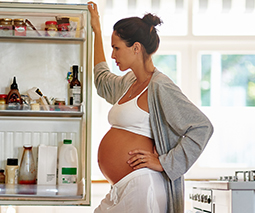Pregnancy symptoms may reveal your baby’s gender after all, finds study

Expectant mums have long claimed various symptoms such as cravings and morning sickness vary depending on their unborn baby’s gender.
Now a study has revealed there may be some truth to the old wives’ tales about the noticeable differences in pregnancy based on whether a woman is carrying a girl or boy.
The study
Researchers from The Ohio State University Wexner Medical Centre published data in the journal Brain, Behavior, and Immunity, that reveals there is a relationship between baby’s gender and a pregnant woman’s immune responses.
The team tracked 80 expectant mums during their pregnancy in 2016 and examined if immune markers called cytokines varied based on foetal sex.
They looked at the levels of cytokines in the blood and levels produced by a sample of immune cells that were exposed to bacteria in the lab.
“While women didn’t exhibit differences in blood cytokine levels based on foetal sex, we did find that the immune cells of women carrying female foetuses produced more pro-inflammatory cytokines when exposed to bacteria,” the study’s principal investigator Amanda Mitchell says.
“This means that women carrying female foetuses exhibited a heightened inflammatory response when their immune system was challenged, compared to women carrying male foetuses.”

What do the findings mean?
Inflammation is an important part of the body’s immune response as it fights any illness, virus or bacteria, but excessive inflammation can also contribute to sickness-related symptoms, such as achiness and fatigue.
While there is scope for further research, the study, published in 2017, found the heightened inflammation observed among women carrying baby girls, which could explain why they tend to experience heightened symptoms of some medical conditions, including asthma, more so than those carrying boys.
“This research helps women and their obstetricians recognise that foetal sex is one factor that may impact how a woman’s body responds to everyday immune challenges and can lead to further research into how differences in immune function may affect how a women responds to different viruses, infections or chronic health conditions (such as asthma), including whether these responses affect the health of the foetus,” Amanda says.
More research needed
While maternal inflammation can impact the foetus, such as increasing the risk of premature birth, more research is needed to understand how a baby’s gender contributes to maternal inflammation.
Amanda says it’s possible the gender-specific hormones or other hormones present in the placenta play a role.
“It’s important to think about supporting healthy immune function, which doesn’t necessarily mean boosting it – it’s problematic to have too little or too great of an immune response,” she says.
“That being said, research has shown that exercise supports healthy immune functioning, as does eating some foods, like leafy greens, and relaxing with activities like meditation.
“Of course, it’s always important to check with your healthcare provider before making any changes to your routine or diet.”
However, women all across the world may give birth every day but no two pregnancies, just like no two women, are the same.
 Need some support to be the best parent you can be? Our Parent School parent coaching experts can help. Click to find out more or book a one-on-one session.
Need some support to be the best parent you can be? Our Parent School parent coaching experts can help. Click to find out more or book a one-on-one session.








